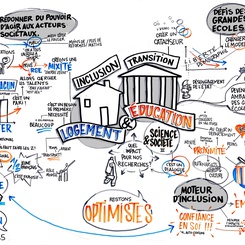Back in March 2020, universities around the world transitioned to online learning virtually overnight due to the COVID-19 pandemic. Instead of sitting in lecture halls, students have been "attending" lectures virtually, with the comforts (and discomforts) of home... and all its distractions.
On surveys, students said that they miss physical lectures. Why? Partly because they do miss each other, of course. But also because the classroom, with its blackboard, chalk smell, and physical space allows them to manage a scarce resource: not time, not money… but attention. Students are not the only one longing to go back to campus. For workers who have been able to work from home, doing so has accentuated multitasking. People are required to juggle work activities (answering emails, dealing with paperwork, doing research or creative work…) while at the same time doing laundry and managing family life. Transitioning from home to work and back has never been faster and yet, it has never been more difficult to shift our attention from one mental space to the other.
What is true about physical and mental spaces is also true about knowledge. Information abundance leads, as Herbert A. Simon identified in the 1970s, to attention scarcity. The trade-off that workers, managers and students face is not so much between work and leisure, that is, between money and time. Rather, an increasing amount of daily choices involve managing our attention budget: what should we “pay” attention to? When do we “demand” attention ? And how much attention do we “give” or “supply”? Indeed, language clearly shows that, more than ever before, we are now living in the “Attention Economy”, as coined by Simon himself. How then should we allocate our attention to make the most out of the oversupply of information? And what consequences does this imply for the future of education, particularly in business schools?
Our classes in tomorrow’s business schools should provide the tools to search, process and utilize knowledge: in short, like old maps, we should map the way through the maze of current information, knowledge and opinions. Which study is relevant? Which authors are leading the conversation? How and where can we find information? Scientific-based decisions for firms and organizations and ultimately individuals cannot rely solely on media or serendipity. Yet the knowledge frontier is not just one “click” away. It requires training. That could be the added value of business schools tomorrow: Creating a roadmap for knowledge acquisition, allowing students to understand not only the frontier of knowledge but also how social science research evolved through recent history, what were the key debates in the past, and the origins of the current consensus and disagreements. Ultimately, this methodology can not only enrich the process of knowledge transmission but also allow each one of our participants to investigate other realms of interest in a rigorous way, even in roads of knowledge that are “less travelled”.
Political, economic and social choices require not only navigating the abundance of information, but also managing different goals. Here, again, attention plays a key role. Recent events show that we live in an “Economy of Attention”, where public opinion is increasingly globalized. In a matter of minutes, the same content can become viral throughout the world. Seizing our attention, we are now expected to react to such events, even when we ignore their context, history or details. Business schools could provide the tools to allow their students and communities more broadly to transform attention into intention. Why are others seeking our attention? How can we utilize this attention with intent? In the past, events like sports championships have served to create a sense of togetherness and build social capital. Today, globalized news attracts the attention of audiences from all backgrounds. While they see the same news, not all have the same “outlook”. Nurturing intent is as important as learning the facts. Now that a globalized public opinion is emerging, how do we create a globalized social capital? Education has an essential role to play in fostering a globalized social capital that would be instrumental in fostering international cooperation in the management of common environmental goods, among other goals
As we prepare ourselves to come back to our classrooms in the coming academic year, the classroom takes on a new meaning as a physical and a mental space. It provides a space that levels the playing field in terms of attention. Inequalities in economic resources do translate into inequalities in the attention endowments that individuals have. Smaller endowments of attention result from inferior material conditions like small and noisy environments or spaces inhabited by conflict and struggle. By sharing a common space and time, students and professors create the possibility of a dialogue where “cards are not played” beforehand. The stability of a free society depends on such spaces delivering their full potential: let us bring into our classrooms diverse travelers that create new roads to address future challenges together.








